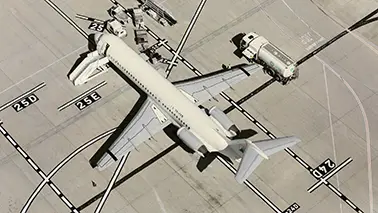H4 Marseille Fos: Provence, spearheading carbon-free aviation
Published on 03.07.2025

As Europe tightens its regulations on CO2 emissions in aviation, a major project is emerging in Fos-sur-Mer, promising to transform the South Region - Provence-Alpes-Côte d'Azur into a centre of excellence for sustainable aviation fuels. Here is an overview of this ambitious project for the region.
France's response to European and global challenges in aviation decarbonisation
The European ‘Refuel EU Aviation’ directive requires the gradual incorporation of sustainable aviation fuels (SAF and e-SAF), with a target of 2% by 2025 and 70% by 2050 for SAFs, including 1.2% from 2030 for e-SAFs, to reach 35% by 2050. The H4 Marseille Fos Fos project is positioned as a concrete and ambitious response to these challenges. With an investment of €1.5 billion, it aims to be operational by 2030 to produce 75,000 tonnes of e-SAF per year*. This could represent up to 35% of the total volume of fuel currently consumed at Marseille Provence Airport.
The environmental impact of this initiative is significant: the project would avoid 240,000 tonnes of CO₂* each year, which is equivalent to nearly 3,750 transatlantic flights carrying one million passengers*. This project is essential for the decarbonisation of airports in the south-east quarter of France, with an agreement already in place with Marseille Provence Airport.
A major project for the decarbonisation of Marseille Provence Airport
More than 98% of the airport platform's GHG emissions are generated by sources not directly controlled by the airport operator (Scope 3). Half of all flights departing from and arriving at Marseille Provence, accounted for as such according to the methodology in force, represent around 85% of the airport's total emissions.
While the carbon impact of sustainable aviation fuels (SAF) is already estimated at -65% compared to conventional kerosene, e-SAF producers are aiming for up to an 80% reduction in GHG emissions over the entire life cycle of their fuel. This project therefore makes a significant contribution to the airport's decarbonisation trajectory.
A major competitive advantage for the region and the country
Beyond the environmental aspect, H4 Marseille Fos represents a significant competitive advantage for the region, placing an e-SAF production centre close to a major consumption site, namely the airport.
Marseille Provence Airport anticipates a need for 210,000 tonnes of fuel per year by 2030; compliance with the RefuelEU Aviation standard will therefore require the incorporation of 2,600 tonnes of e-SAF per year from 2030, rising to 20,000 tonnes in 2040 and 60,000 tonnes in 2050.
In economic terms, H4 Marseille Fos is a real driver of employment, creating 165 direct jobs, 100 indirect jobs and 495 induced jobs.
Industrial innovation and the strategy for autonomy
A major industrial innovation, the project aims to guarantee France and Europe strategic autonomy in terms of aviation fuels by replacing imports of fossil kerosene with locally produced renewable fuels.
The project's competitiveness is based on several major advantages of the Fos region: a low-carbon French energy mix (nuclear and renewable energies), access to industrial CO₂, existing infrastructure and recognised industrial expertise.
H4 Marseille Fos is not just an industrial project; it is a bold bet on the future, positioning France and its southern region at the forefront of decarbonisation in aviation and maritime transport.